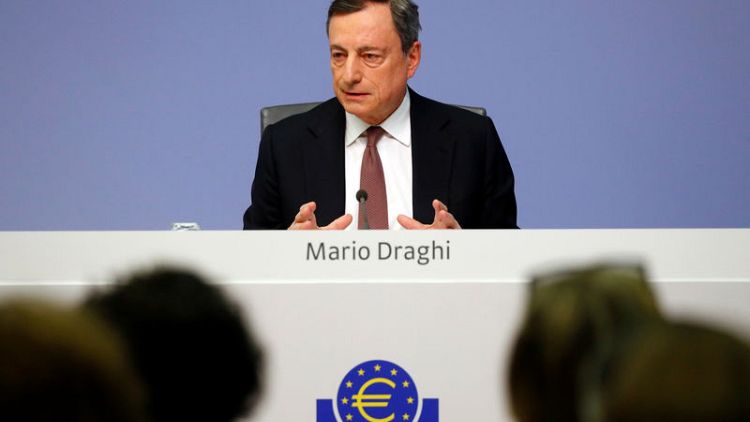By Balazs Koranyi and Francesco Canepa
FRANKFURT Reuters) - The European Central Bank kept its ultra-easy monetary policy unchanged as expected on Wednesday, giving recent stimulus measures time to work their way into the economy and counter spreading global gloom.
ECB President Mario Draghi confirmed that policymakers were considering measures to mitigate the impact on banks of its negative deposit rates as well as the pricing of new cheap two-year loans to banks, but said it was too early to decide.
"We need further information that will come to us between now and June," Draghi said.
With economic powerhouse Germany skirting a recession, the ECB has already backtracked on plans to tighten policy but may be reluctant to do more as the root causes of the downturn -- weak demand from abroad and political turmoil -- are largely beyond its policy reach.
At his regular news conference after the meeting, Draghi gave little away on any further planned stimulus measures but highlighted further downside risks linked to global trade tensions and other uncertainties.
"Incoming data continue to be weak, especially for the manufacturing sector ... The slower growth momentum is expected to extend into the current year," he said.
Draghi added that a weakening of inflation would nonetheless "probably bottom" in September and that ECB Governing Council members recognised the underlying strength of the economy.
"The estimated probabilities of a recession remain low," he concluded of the risk to the euro zone's economy.
Highlighting the global turbulence, U.S. President Donald Trump threatened on Tuesday to impose tariffs on $11 billion worth of European Union products, opening a new chapter in his global trade war that is certain to dent confidence further.
The International Monetary Fund warned overnight that the global economy is slowing more than expected and a sharp downturn could require world leaders to coordinate stimulus.
"It certainly undermines general confidence," Draghi said of Trump's threats, while adding that rhetoric on trade policy sometimes did not translate directly into action.
For its part, the ECB has already gone to extraordinary lengths and promised on Wednesday to keep interest rates at record low at least through this year.
With Wednesday's decision, the ECB's deposit rate, currently its primary interest rate tool, remains at -0.40 percent while the main refinancing rate stands at 0.00 percent.
TIERING?
With Draghi having argued that the ECB must study whether it needs to mitigate the unwanted effects of negative rates, some are hoping it will offer relief to banks, who transmit the bulk of the ECB's policy to the real economy through their lending.
One option under study is a tiered deposit rate, which would shield lenders from part of the cost they pay on cash they deposit at the ECB, in a similar vein to moves by central banks in Switzerland and Japan.
But Draghi, while acknowledging that current levels hurt the profitability of European banks compared to their U.S. counterparts, said it was too early for a decision.
"We haven't discussed the merits or cons of mitigating measures ... we need further information that will come to us between now and June," he said, adding that there had been a consensus on the need for further analysis.
A survey of lending published on Tuesday also tempered the need for any urgent mitigating measures as lenders said they expected business credit to grow and lending standards to ease this quarter.
The ECB also needs to keep its remaining policy powder dry in case of market turbulence around Brexit and the continued escalation of a global trade war, with risks growing that the U.S. administration will turn its attention to Europe.
Another complication with shifting to a tiered deposit rate is that it would signal low rates for longer, which is inconsistent with the bank's guidance for a growth rebound later this year and a rate hike in 2020.
(Writing by Mark John, Editing by Catherine Evans)



